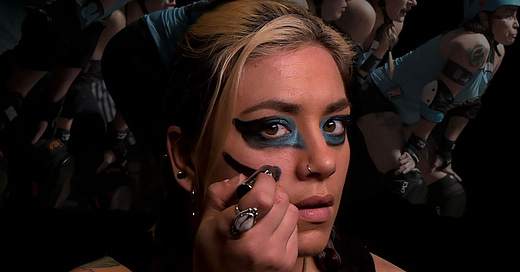In the roller derby documentary Minnesota Mean from filmmaker Dawn Mikkelson, one of the women tells the camera that she always has loved sports, but she felt like sports for women were kind of the little sister versions of men’s sports. When she discovered roller derby, that was the first time she felt like she was playing a sport that was specifically for women. The sense of camaraderie is evident throughout the entirety of this documentary, which is available on Video on Demand.
Minnesota Mean follows six women on a roller derby team as they compete for the Hydra trophy, the highest prize in flat track roller derby. Teams are made up of jammers who score the points and blockers who try to keep the jammers from scoring. The team loses Brickyard, one of their top jammers, to a significant ankle injury, forcing them to bring in Switch Please, a woman who has not competed at this level of derby. We watch this team fight through wins and losses as they strive for victory in their often overlooked sport.
The documentary is filmed in multiple ways. There is plenty of action on the track, which was no doubt perilous to film, given the number of injuries that we saw the players experience. There are also many personal interviews with members of the team as they explain why they play derby and how it impacts their lives off the track. The film includes time in the locker room during games when the audience is given an opportunity to hear some strategy.
The documentary does an excellent job of highlighting not only the events on the track but also what the women are doing in their lives outside of roller derby. We see a wedding. We see one woman struggle through multiple miscarriages. We see injuries. We see an Indigenous woman working to make things safer for her community. We see players of different body types, different sexual orientations, different races, and different gender identities. But all of them have the common goal of winning and growing stronger as people through roller derby.
What was interesting was some of what wasn’t shown in this documentary. Despite the conversation about trans women in women’s sports, the presence of a trans woman in this team is barely discussed outside of her role as one of the jammers. While Mikkelson could have shoehorned in a conversation on that topic, she instead simply follows the story where it goes, and that isn’t a part of the story that these women are telling.
Ultimately, that was what made this documentary fun to watch. It could glom on to any hot-button issues that might have made it more “culturally relevant” but would have ultimately drawn attention away from the sport. And if you’re making a documentary about a sport, especially one that is so completely and utterly unique and female, maybe that’s all the drama that you need.
This review originally appeared in The Dominion Post on July 13, 2024.
Watch my interview with director Dawn Mikkelson.






